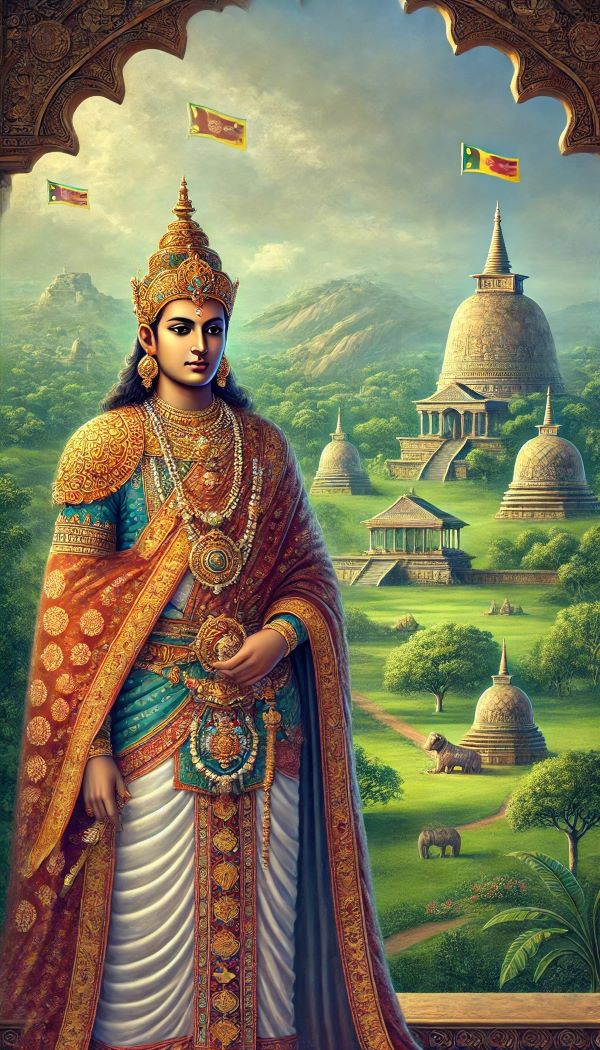Sirisangabo: A Legacy of Devotion and Sacrifice – By Bhanuka – eLanka

Sirisangabo, also known as Siri Megha Vanna, was born into a noble family in the Anuradhapura Kingdom around the early 3rd century CE. The Anuradhapura Kingdom, founded in the 4th century BCE, was one of the most significant and long-lasting civilizations in ancient Sri Lanka. It was a period marked by profound cultural and religious development, with Theravada Buddhism playing a central role in shaping the kingdom’s identity.
Sirisangabo was known for his piety and deep spiritual inclinations from a young age. His upbringing in a Buddhist environment fostered his devotion to the teachings of the Buddha, and he often sought the company of monks and ascetics. This spiritual foundation would later influence his decisions and actions as a ruler.
Ascension to the Throne
Sirisangabo ascended to the throne in 252 CE, following the reign of his predecessor, King Sanghatissa. The Anuradhapura Kingdom, during this period, was experiencing political instability and power struggles among various factions. Despite the challenges, Sirisangabo’s reign was characterized by his efforts to restore peace and stability to the kingdom.
As king, Sirisangabo was known for his humility and benevolence. He implemented policies aimed at improving the welfare of his subjects, focusing on agricultural development, infrastructure, and the promotion of Buddhist teachings. His reign, though short, was marked by a sense of justice and compassion that endeared him to the people.
Abdication and Life as an Ascetic
Sirisangabo’s commitment to his spiritual path and his desire to avoid bloodshed led him to make a profound decision. In a remarkable act of selflessness, he abdicated the throne voluntarily in favor of his younger brother, Gotabhaya. This decision was driven by his belief that the kingdom would be better served by a ruler who was more politically astute and capable of maintaining stability.
After abdicating, Sirisangabo retreated to the forests of Sri Lanka, embracing the life of an ascetic. He sought solitude and devoted himself to meditation and the pursuit of enlightenment. His life in the forest was a testament to his deep spiritual convictions and his desire to renounce worldly attachments.
The Ultimate Act of Sacrifice
The most defining moment in Sirisangabo’s life came when his successor, King Gotabhaya, fearing potential threats to his rule, offered a reward for Sirisangabo’s head. Despite the danger, Sirisangabo remained steadfast in his commitment to non-violence and compassion.
One day, while meditating in the forest, Sirisangabo was approached by a man who sought the reward offered by the king. Recognizing Sirisangabo, the man hesitated, but Sirisangabo, understanding the man’s plight, offered his own head willingly. He calmly instructed the man on how to sever his head and assured him that this act would bring him the reward he sought.
This act of supreme self-sacrifice is one of the most poignant and revered stories in Sri Lankan history. It underscores Sirisangabo’s unwavering adherence to his principles and his profound compassion for others, even at the cost of his own life.
Legacy and Cultural Significance
Sirisangabo’s legacy continues to be celebrated in Sri Lanka, where he is revered as a symbol of selflessness, compassion, and piety. His story is commemorated in various religious and cultural practices, and his life serves as an inspiration to many.
Isurumuniya Temple: One of the most significant sites associated with Sirisangabo is the Isurumuniya Temple in Anuradhapura. This ancient temple, known for its exquisite rock carvings, is believed to be connected to the life of Sirisangabo. Pilgrims visit the temple to pay homage and reflect on the values embodied by the king.
Mahavamsa: The ancient chronicle Mahavamsa, written in the 5th century CE, documents the life and reign of Sirisangabo. This historical text provides a detailed account of his abdication, life as an ascetic, and ultimate sacrifice. The Mahavamsa remains a crucial source of historical and cultural knowledge in Sri Lanka.
Cultural Festivals: Various cultural festivals and religious ceremonies in Sri Lanka commemorate the life of Sirisangabo. These events often include traditional performances, storytelling, and rituals that highlight his selfless acts and dedication to Buddhism.
Literature and Art: Sirisangabo’s story has been immortalized in Sri Lankan literature and art. Folklore, poems, and paintings depict scenes from his life, emphasizing the moral and ethical lessons it imparts. His narrative serves as an educational tool, instilling values of sacrifice, compassion, and humility in younger generations.
Modern Reflections
In contemporary Sri Lanka, the legacy of Sirisangabo resonates deeply, particularly in a society that values Buddhist teachings and principles. His story is a reminder of the enduring power of compassion and the importance of selflessness in leadership and daily life.
Conclusion
The life of Sirisangabo is a testament to the timeless values of compassion, humility, and altruism. His story, marked by profound self-sacrifice and unwavering devotion, continues to inspire and resonate with people across Sri Lanka and beyond. Through the lens of his legacy, we are reminded of the highest ideals of Buddhist philosophy and the profound impact of selfless acts on society.
Sirisangabo’s tale is not merely a historical account; it is a beacon of hope and inspiration for all humanity. As we reflect on his legacy, we are encouraged to embrace these values in our own lives, fostering a society that upholds the principles of justice, kindness, and selflessness.







